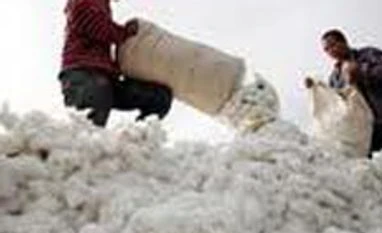India is all set to beat China and become the top cotton producer this year, ousting the communist nation from the number 1 position for the first time in over 30 years, the US has said in a report.
The US Department of Agriculture (USDA) data suggest that India will produce 30 million bales of cotton in the season starting August 1 while China will produce 29.5 million bales.
The USDA increased its prediction of Indian production from 29 million bales last month, while China's remained unchanged.
Total area in China is projected to decline 11% to 4.35 million hectares, with a record yield forecast at 1,477 kg per hectare.
While for India, the late monsoon will likely benefit cotton; some area originally expected to be devoted to alternative crops-with an earlier planting window-is now projected to move to cotton.
Meanwhile in Beijing, China's Ministry of Agriculture has admitted to the decline in the country's cotton output.
The relatively low profitability of cotton on the government's decision to abolish its "temporary purchasing policy" to prop up prices, said Pan Xiufen, a senior agronomist at MoA.
Pan expected the growing area of cotton in China to continue its declining trend in the next few years, state-run Xinhua News Agency reported.
China will remain a big consumer of cotton due to its large population, growing incomes and increasing export demand, the MoA said, adding that the shrinking growing area would result in a big supply gap in the cotton market.
Observers say that this could create big demand for India to step up its cotton and yarn to China which already amounted to few billion USD.
The MoA report said the cotton growing area in the Yangtze River Basin and the Yellow River Basin went down by about 12. 1% and 14.5%, respectively.
Hebei and Jiangsu provinces, two of the country's major cotton regions, saw their growing areas decline at 16.4% and 20% respectively, the MoA officials said.
In Jiangxi Province, another important cotton growing region, cotton cultivation areas has fallen by at least 10%, and some major cotton growers have cut their planting areas by nearly half.
The US Department of Agriculture (USDA) data suggest that India will produce 30 million bales of cotton in the season starting August 1 while China will produce 29.5 million bales.
The USDA increased its prediction of Indian production from 29 million bales last month, while China's remained unchanged.
Also Read
The reduction is largely due to the fewer incentives farmers are getting for planting cotton in China's eastern provinces, the report said.
Total area in China is projected to decline 11% to 4.35 million hectares, with a record yield forecast at 1,477 kg per hectare.
While for India, the late monsoon will likely benefit cotton; some area originally expected to be devoted to alternative crops-with an earlier planting window-is now projected to move to cotton.
Meanwhile in Beijing, China's Ministry of Agriculture has admitted to the decline in the country's cotton output.
The relatively low profitability of cotton on the government's decision to abolish its "temporary purchasing policy" to prop up prices, said Pan Xiufen, a senior agronomist at MoA.
Pan expected the growing area of cotton in China to continue its declining trend in the next few years, state-run Xinhua News Agency reported.
China will remain a big consumer of cotton due to its large population, growing incomes and increasing export demand, the MoA said, adding that the shrinking growing area would result in a big supply gap in the cotton market.
Observers say that this could create big demand for India to step up its cotton and yarn to China which already amounted to few billion USD.
The MoA report said the cotton growing area in the Yangtze River Basin and the Yellow River Basin went down by about 12. 1% and 14.5%, respectively.
Hebei and Jiangsu provinces, two of the country's major cotton regions, saw their growing areas decline at 16.4% and 20% respectively, the MoA officials said.
In Jiangxi Province, another important cotton growing region, cotton cultivation areas has fallen by at least 10%, and some major cotton growers have cut their planting areas by nearly half.
)